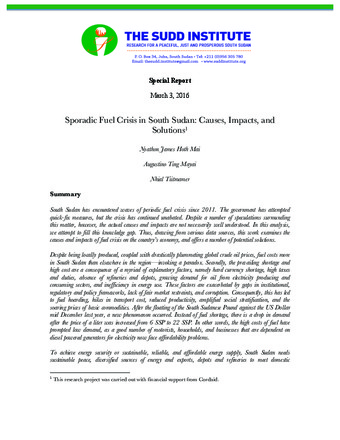Sporadic Fuel Crisis in South Sudan: Causes, Impacts, and Solutions

Authors: Nyathon Hoth Mai, Nhial Tiitmamer, Augustino Ting Mayai
Organization: The Sudd Institute
Type: Special Reports
Date: 03/03/2016
Keyword(s): South Sudan
Publication Summary
South Sudan has encountered waves of periodic fuel crisis since 2011. The government has attempted quick-fix measures, but the crisis has continued unabated. Despite a number of speculations surrounding this matter, however, the actual causes and impacts are not necessarily well understood. In this analysis, we attempt to fill this knowledge gap. Thus, drawing from various data sources this work examines the causes and impacts of fuel crisis on the country’s economy, and offers a number of potential solutions.
Despite being locally produced, coupled with drastically plummeting global crude oil prices, fuel costs more in South Sudan than elsewhere in the region—invoking a paradox. Secondly, the prevailing shortage and high cost are a consequence of a myriad of explanatory factors, namely hard currency shortage, high taxes and duties, absence of refineries and depots, growing demand for oil from electricity producing and consuming sectors, and inefficiency in energy use. These factors are exacerbated by gaps in institutional, regulatory and policy frameworks, lack of fair market restraints, and corruption. Consequently, this has led to fuel hoarding, hikes in transport cost, reduced productivity, amplified social stratification, and the soaring prices of basic commodities. After the floating of the South Sudanese Pound against the US Dollar mid December last year, a new phenomenon occurred. Instead of fuel shortage, there is a drop in demand after the price of a liter was increased from 6 SSP to 22 SSP. In other words, the high costs of fuel have prompted low demand, as a good number of motorists, households, and businesses that are dependent on diesel powered generators for electricity now face affordability problems.
To achieve energy security or sustainable, reliable, and affordable energy supply, South Sudan needs sustainable peace, diversified sources of energy and exports, depots and refineries to meet domestic consumption. Meanwhile, the country ought to: reduce costly import duties and taxes to lower prices, strengthen its economic relations with Sudan and Kenya to ensure adequate access to fuel, as well as pursuing public awareness on conservation and efficient use of limited fuel supply to lower demand and protect the environment. The recent re-opening of the South Sudanese-Sudanese borders and the admission of South Sudan to the East African Community are opportunities in the right direction.
Nyathon Hoth Mai is Environment and Natural Resources Program Officer at the Sudd Institute. Before joining the Institute full time, Nyathon worked as Research Associate between Oct 2015 and Jan 2019. She has a BSc in Geology from the Federation University, Australia, and an MSc in Global Energy and Climate Policy from the School of Oriental and African Studies (SOAS), University of London. She is also an independent Researcher and policy analyst. Her research interest areas include Geology, climate change and energy policy, and issues affecting South Sudanese women. In addition, Nyathon was the Co-founder and Managing Director of My Referendum for Freedom (MRF) that actively engaged the South Sudanese youth from all over South Sudan and diaspora as a vehicle for civic education to the rest of the populace during the South Sudan Referendum. She also devoted much of her time to South Sudan community development in Australia.
Nhial Tiitmamer has served as the Director of the Environment and Natural Resources Program at The Sudd Institute where he is currently on leave to work with United Nations in South Sudan (UNMISS). He has served as an Adjunct Assistant Professor at the University of Juba where he has taught Environmental Economics, Natural Resources Economics and Environmental Sociology. Between November 2021 and November 2022, Nhial worked as Senior Environment Associate with the United Nations High Commissioner for Refugees (UNHCR) in Juba. Before returning from Canada in 2013, Nhial worked at Arletta Environmental Consulting in Calgary and at University of Alberta’s Augustana Campus in Camrose in Alberta, Canada. Nhial’s research focusses on natural resources governance, environmental protection, climate change, and sustainable energy. He was awarded in May 2023 by the Board of Directors of The Sudd Institute with Research Impact Award for policy impacts. Nhial holds a B.A. in Environmental Studies with a minor in English Literature from the University of Alberta and an M.Sc. in Sustainable Energy Development from the University of Calgary in Alberta, Canada.
Augustino Ting Mayai's Biography
Augustino Ting Mayai is the former Managing Director of the Sudd Institute. He is a founding Research Director of the same institution, serving in this capacity for a decade. He holds a Ph.D. in Sociology, with concentrations on demography and development from the University of Wisconsin-Madison. He currently studies how state effectiveness affects child health outcomes in South Sudan and Ethiopia. Dr. Mayai has written extensively on South Sudan’s current affairs. August is the current Chair (Statistician General) of the National Bureau of Statistics, Government of South Sudan.
